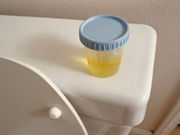Findings among studies predicting kidney stone recurrence or treatment response
THURSDAY, April 13, 2017 (HealthDay News) — Despite guidelines, it has not been established whether all recurrent kidney stone formers benefit from 24-hour urine collection, according to a review published in the April issue of The Journal of Urology.
Ryan S. Hsi, M.D., from Vanderbilt University in Nashville, Tenn., and colleagues conducted a literature search to identify controlled studies of dietary and pharmacological interventions and evaluate evidence supporting the American Urological Association and European Association of Urology guidelines for metabolic stone prevention.
The researchers found that the 24-hour urine test has several limitations, including the complexity of interpretation, the need for repeat collections, the inability to predict stone recurrence with individual parameters and supersaturation values, the unclear rationale of laboratory cut-off values, and the difficulty of determining collection adequacy. Selective dietary recommendations based on 24-hour urine collection results were compared to general dietary instructions in only one prospective trial, with significant limitations. In intervention trials, placebo arms showed a decreased rate of stone recurrence ranging from 0 to 61 percent and a remission rate of 20 to 86 percent during the study.
“Additional comparative effectiveness trials are needed to determine which stone former benefits from selective therapy, as guided by the 24-hour urine collection,” the authors write.
Copyright © 2017 HealthDay. All rights reserved.








